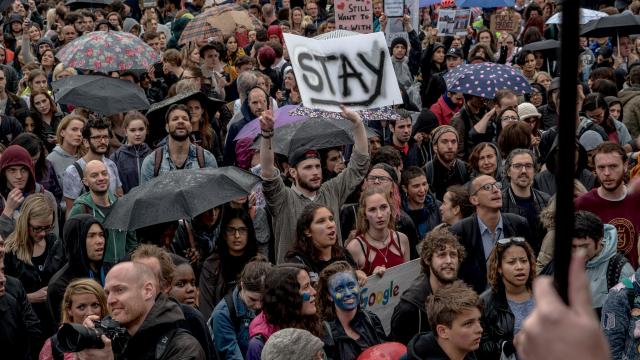
On December 24, 2020, a trade deal struck between London and Brussels ended the UK’s 30-year membership of the European single market. The last-minute agreement brought some relief as a no-deal Brexit was narrowly averted. It will, however, bring sweeping changes and have far-reaching consequences bearing scars – including for many students.
One of the casualties of the post-Brexit trade agreement was the UK’s withdrawal from the Erasmus student exchange programme. The move means that students from Britain – except those in Northern Ireland, who are still able to participate – will miss out on a culturally-enriching experience. But there are other social and economic ramifications as well.
Since it was established in 1987, Erasmus has enabled more than 9 million European students to study, learn and train abroad. The world’s most successful student mobility programme has changed lives – not only for the students themselves, who come from so many different backgrounds, but for everyone else impacted by the programme.
One of my fondest memories of living in Spain for almost a decade was meeting up with my dad, Dr. Andy Pickard, in Granada. My dad was an Erasmus coordinator for Manchester Metropolitan University at the time. Every so often he’d visit the University of Granada as part of his Erasmus commitments. Living nearby, I’d see him and we’d enjoy beer and tapas together while soaking up the vibrant, multicultural atmosphere of university life in the cosmopolitan Spanish city.
Fast-forward 10 years to Britain’s exit from the European Union, and this much-loved, culturally-inspiring programme is one of the first fatalities of Brexit.
For me, Britain’s abrupt departure from Erasmus marks a depressing demise of multi-ethnic, all-inclusive relations with Europe, and poignantly demonstrates the “Little Englander” mentality that has gripped much of Britain since the EU referendum in 2016.
It could also be argued that the withdrawal shows short-sightedness from a prime minister who let his Eurosceptic thirst to “get Brexit done” result in a UK-EU trade deal that threatens to weaken the UK economy and undermine cultural relations with its European neighbours.
The decision to quit Erasmus, which came into effect on January 1, was presented by Boris Johnson as an economical one, with the Prime Minister describing UK participation as “extremely expensive” and one that the “UK exchequer lost out on.”
But Johnson’s brief explanation failed to touch on the millions of lives Erasmus had enriched, and the opportunities, experiences and skills it has created.
Michael Barnier, the EU’s chief negotiator, singled out Britain’s Erasmus departure as one of his “regrets” of the post-Brexit trade deal. Many that have been directly involved with Erasmus, including students of the scheme, voice similar disappointment.
My dad, former head of the Education Faculty at Manchester Metropolitan University in addition to his Erasmus commitments, shared his disappointment about the post-Brexit abolition of the student exchange scheme.
“I am saddened that British students (apart from those in Northern Ireland) will no longer be able to participate in such a great experience. We sent many hundreds of students over the years to all parts of Europe. We also received students from all our partner universities who would study alongside our students and visit our schools,” he told me.
“For all those young people, the experience was invaluable and for some life-changing. Our students were training to be teachers and the opportunity to work in schools with different philosophies and practices from those in the UK was something they could think about and maybe carry into their own classrooms.”
It's not unfair to say that students in the UK have long lagged behind their European neighbours in learning a foreign language. Erasmus not only gave young people the opportunity to learn new cultures, philosophies and experiences, but also an “international edge” and opportunity to “close the gap” on other European countries, which had long had the upper hand on bilingual speaking.
But concerns about leaving Erasmus don’t just begin and end with a loss of benefits to students. More broadly, it will inevitably impact the UK’s future workforce, and ultimately the country’s bottom line.
Throughout the Brexit process, the UK has seen a reduction in net migration. Many now are asking how the country will fare without diverse incoming talent through sources like Erasmus.
More broadly, the scrapping of Erasmus shows Brexit’s commitment to “de-Europeanisation” and growing antipathy towards anything not British.
Erasmus helped create the fabric of a larger European community. Participation in the scheme was part of a wider commitment to the Europeanisation of UK institutions. Sadly, since the offset, Brexit has been committed to withdrawing from Europeanisation while showing a rising antagonism to all things European.
The British mass media are dominated by Eurosceptics keen to promote aversion towards Europe. The likes of the Times, Daily Mail, Telegraph, and Daily Express don’t hold back in pouring scorn on anything that isn’t British – the EU foremost among their targets. Such negative coverage of Europe inevitably influences readership, including politicians and the wider electorate.
“UK In A Changing Europe,” an authoritative source for independent research on UK-EU relations, notes that the Euroscepticism driven by much of the British media has “strongly influenced the ways in which UK politicians think about what is achievable in their European policies, as well as what is desirable in the first place.”
In fact, the groundwork had already been laid for the Leave campaign in the decades that preceded the EU referendum by Britain’s highly Eurosceptic press.
As Francis Rawlinson argues in his book, How Press Propaganda Paved the Way to Brexit, press propaganda pushed out by right-wing newspapers helped tip the referendum in favour of a Leave vote. Given years of Euroscepticism being promoted onto the front pages, the survival of something as “minority” as Erasmus in the wake of Brexit didn’t stand a chance.
In Prime Minister’s Questions in January 2020, Boris Johnson downplayed fears that the Erasmus programme was under threat. “There is no threat to the Erasmus scheme,” he told MPs. “UK students will continue to be able to enjoy the benefits of exchanges with our European friends and partners.”
Almost exactly a year later, we now know the untruthfulness of Johnson’s words, as Erasmus has been eliminated for UK students, replaced by a UK-only scheme named after the mathematician Alan Turing.
Trading the Europe-wide student exchange scheme for a “Britain-only” replacement not only robs youngsters of their chance to experience “real Europe” as opposed to the one so often constructed by the right-wing press. It also threatens the nation’s bottom line by discouraging the diverse, incoming talent the country desperately needs – all while peddling right-wing antipathy towards anything “non British.”














